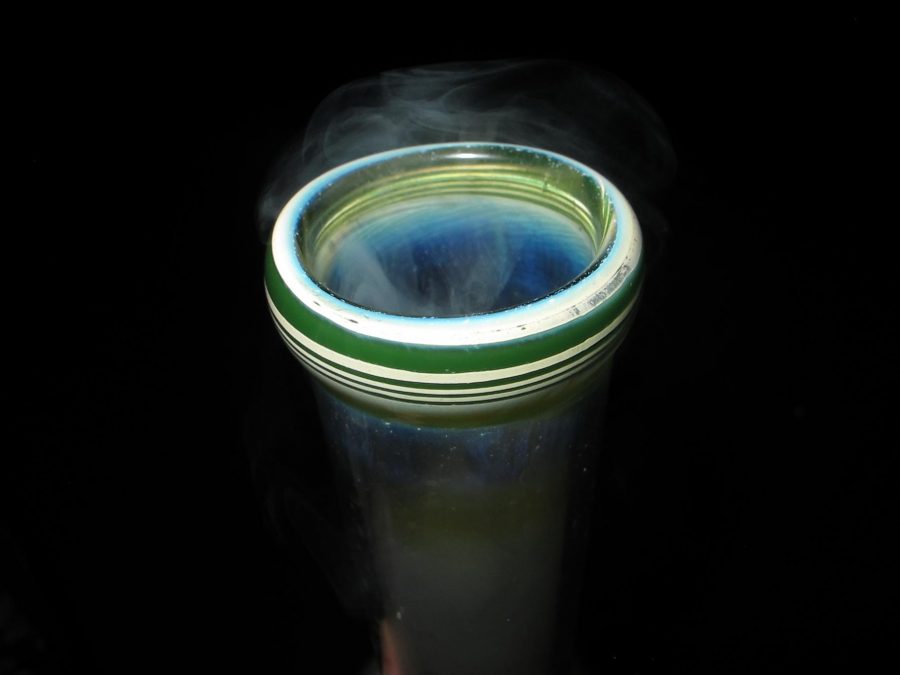Enhancing the couch potato
Smoke rolls off the top of a bong; a common smoker’s paraphernalia. Photo credit: Molly-Anne Dameron
September 4, 2015
We, academic-achieving, jet-setting and thrill-seeking souls, are not as invincible as we may have thought. California boasts a marijuana lover’s dreamworld, where we, the younger generation of civilians, can be naive enough to claim only positive effects to smoking grass.
Why are we so defensive when asked, “is marijuana addictive?” Of course it can be; everything can be addictive, just name it!
“It’s like saying a peanut is going to cause an allergic reaction to everybody,” said Douglas Rosen, Director of Partners in Prevention at Beit T’Shuvah Treatment Center in Los Angeles. “The latest research shows that some can actually have physical withdrawal symptoms; 1 in 6 days teenagers are physically addicted to the drug. It has the potential to lower IQ up to 8 points and overall impact your executive functioning.”
You may think, what isn’t fun about smoking pot? Try first answering, what is enjoyable about it? We use the words ‘fun’ and ‘enjoy’ interchangeably, although they do not beget the same outcome. Laughing at corny sitcoms while noshing on m&m’s is endless fun, but is it truly enjoyable to sit on the couch, failing to resist stuffing your mouth with candy, while hours later realizing you did absolutely nothing productive? There is nothing more unfulfilling than realizing you’ve become the epitome of a ‘couch potato’.
“Weed has become the quick fix,” said Nicole Goodman, a sober member of Beit T’ Shuvah. “Many people have anxiety, it is a part of being human, but we, as a generation, do not know how to sit with our feelings.”
Rosen, 11 years sober, and Goodman 3 1/2 years sober, have experienced the ‘ins’ and ‘outs’ of drug addiction. By acting as mentors to addicts alike, they’ve gained insight into the world of addiction: a world that some may not be privy to, and others may try to reconcile with.
“Weed helped me so much that soon enough I developed a co-dependent relationship with it,” Goodman recalls.
Students who smoke pot daily are 60 percent less likely to graduate college, according to The Lancet Psychiatry.
“Up until the age of 25, you probably shouldn’t do anything [drug experimentation]; but we’re human beings, and we seek these sorts of thrills,” said an anonymous second year Moorpark College student.
I don’t want to dwell too heavily on the negatives of lighting up, because certainly there are positive aspects. Once your brain stops developing, there are a multitude of reasons why marijuana use can prove beneficial. For instance, somebody dealing with a true case of insomnia, anxiety, or even illness.
There are valid cases of individuals who benefit from the medicinal value of the plant. These aren’t the phony ‘my back hurts’ pleas you may state to the questionable doctor you found on Ventura Boulevard.
For some, the end to smoking may not seem near or easy to approach. But no matter what, in each and every individual case, pot can either be exhilarating or it can cause detriment.
As Rosen put it, “It’s like playing Russian Roulette with your mind.”
For others, as the anonymous student concluded, “You ride that wave, and when it crusts, you decide it’s time to do something else. They’re just people who want to unwind and have a nice time; Is that really such a crime?”
To find a Narcotics Anonymous location in your area, visit: http://www.na.org/meetingsearch/






